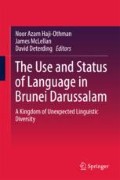Abstract
Compliments are complex multi-functional speech acts which aim to establish, maintain and consolidate social relationships. Holmes (1986) defined a compliment as a speech act which explicitly or implicitly attributes credit to someone other than the speaker, for some ‘good’ possession, characteristic, or skill which is valued by both the speaker and the hearer. Brown and Levinson (1987) refer to compliments as positive politeness strategies which are directed at approving the appearance, personality, possessions and needs of people and at their desire to be treated as members of a group rather than as individuals.
Access this chapter
Tax calculation will be finalised at checkout
Purchases are for personal use only
References
Asmah Haji Omar. (2002). Setia dan Santun Bahasa. Tanjong Malim, Malaysia: Universiti Pendidikan Sultan Idris.
Brown, P., & Levinson, S. C. (1987). Politeness: Some universals in language usage. Cambridge: Cambridge University Press.
Chen, R. (1993). Responding to compliments: A contrastive study of politeness strategies between English and Chinese Speakers. Journal of Pragmatics, 20(1), 49–75.
Chen, R., & Yang, D. (2010). Responding to compliments in Chinese: Has it changed? Journal of Pragmatics, 42(7), 1951–1963.
Chen, S-H. E. (2003). Compliment response strategies in Mandarin Chinese: Politeness phenomenon revisited. Concentric: Studies in English Literature and Linguistics, 29(2), 157–184.
Gu, Y. (1990). Politeness phenomena in modern Chinese. Journal of Pragmatics, 14, 237–257.
Herbert, R. K. (1986). Say ‘thank you’—or something. American Speech, 61(1), 76–88.
Herbert, R. K. (1990). Sex-based differences in compliment behavior. Language in Society, 19, 201–224.
Holmes, J. (1986). Compliments and compliment responses in New Zealand English. Anthropological Linguistics, 28(4), 485–508.
Jucker, A. H. (2009). Speech act research between armchair, field, and laboratory: The case of compliments. Journal of Pragmatics, 41, 1611–1635.
Leech, G. N. (1983). Principles of pragmatics. London: Longman.
Narjes, Z. (2012). Translation on the basis of frequency: Compliment and compliment response. Journal of Translation 16(3). Retrieved October 22, 2015, from http://www.translationjournal.net/journal/61compliment.htm.
Mao, L. M. R. (1994). Beyond politeness theory: ‘Face’ revisited and renewed. Journal of Pragmatics, 21(5), 451–486.
Normala Othman (2011). Pragmatic and cultural considerations of compliment responses among Malaysian-English speakers. Asiatic 5(1), 86–103. Retrieved April 26, 2013, from http://asiatic.iium.edu.my/article/Asiatic%205.1%20pdf%20files/Normala_Othman.
Pomerantz, A. (1978). Compliment responses: Notes on the cooperation of multiple constraints. In J. Schenkein (Ed.), Studies in the organization of conversational interaction (pp. 79–112). New York: Academic Press.
Sari, Y. (2009). Compliment responses used by Indonesians learning English based on the compliment topics and social statuses. Celt, 9(2), 126–149.
Searle, J. R. (1979). Speech acts: An essay in the philosophy of language. Cambridge: Cambridge University Press.
Yousefvand, E., Yousofi, N., & Abasi, M. (2014). The study of compliment speech act responses: A study based on status and gender in Persian. Journal of Applied Environmental and Biological Sciences, 4(3), 182–196.
Yu, M.-C. (2005). Sociolinguistic competence in the complimenting act of native Chinese and American English speakers: A mirror of cultural value. Language and Speech, 48(1), 91–119.
Author information
Authors and Affiliations
Corresponding author
Editor information
Editors and Affiliations
Rights and permissions
Copyright information
© 2016 Springer Science+Business Media Singapore
About this chapter
Cite this chapter
Kamsiah Abdullah (2016). Politeness Strategies of Bruneian Malay Youths in Compliment Speech Acts. In: Noor Azam Haji-Othman, McLellan, J., Deterding, D. (eds) The Use and Status of Language in Brunei Darussalam. Springer, Singapore. https://doi.org/10.1007/978-981-10-0853-5_11
Download citation
DOI: https://doi.org/10.1007/978-981-10-0853-5_11
Published:
Publisher Name: Springer, Singapore
Print ISBN: 978-981-10-0851-1
Online ISBN: 978-981-10-0853-5
eBook Packages: Social SciencesSocial Sciences (R0)

